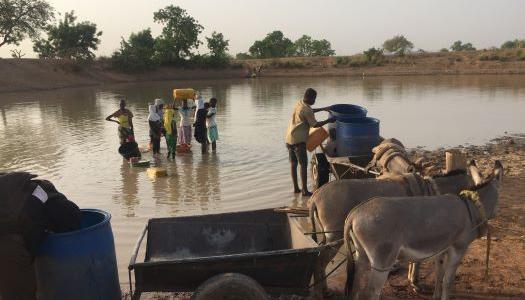Building Sustainability in Sub-saharan Africa

MA Global Leadership student, Michael Redmond, shares insights from his Capstone project
Colonization is a brutal form of oppression, exploits Indigenous people of their culture and lands, and robs them of their natural resources, and in many cases ignoring basic human rights (Ife, 2013, p. 188). The intergenerational impacts of colonialism remain today, in Canada and globally. My Global Leadership capstone project was focused on building a sustainability plan for a small community in the northern region of Ghana called Gbalahi. I completely immersed myself and my family in a foreign land and community, to work as a global leader making a change where basic human rights have been ignored. Mendenhall, et al (2013) describe global leaders as individuals who effect significant positive change by building communities through trust and organizational structure under conditions of temporal, geographical, and cultural complexity.
However, global leadership is about inquiry and letting those who are impacted by such oppressions determine how best to see, be, and do the work needed. It was after several months of development work and research in the region that I narrowed my focus and determined what the most pressing challenges were within this community and other regions. In collaboration, I produced a plan that served a dual purpose; 1) to directly benefit this community and 2) to offer a potential road map for future communities in the region.
It was evident that the color of my skin had an impact or value on my worth. I felt elevated and granted respect without directly earning it. It was important for me to recognize my own white privilege and what that meant to be a white man in sub-Saharan Africa. I kept reflecting on McIntosh’s (2002) White Privilege: Unpacking the Invisible Knapsack, with “having described it, what will I do to lessen or end it?” I believe that question still haunts me today.
I used an intersectional lens to focus on how we can improve human, animal, and plant health. Intersectional research stresses the inclusion of all voices, especially oppressed voices. Consequently, the most difficult aspect of intersectional research is delineating the scope of the study (McIntosh, 2013). The goal was also to make an impact on educational outcomes, gender equality and to improve the socio-economic realities of many families living in remote villages like Ghbalhi. In Leverage Points, Meadows (1999) points to the reality that a small shift in one thing can produce big changes in everything. It was imperative to acquire living knowledge and the shared story, discovering the commonality of purpose and challenges existing in sub-Saharan Africa, but also the opportunities of wealth creation (Ife, 2013). These communities understand the land, the soils and what can work and what will alter the lives of all its inhabitants. This is a bottom-up approach, and much more acceptable than historical decisions of the past.
For the region and the people of Gbalahi, universal access to potable water is a necessity. The United Nations Development Goal #6 - Clean Water and Sanitation was the guiding principle of my capstone project. We are all connected by water and as the UN states, freshwater is becoming more scarce and valuable (Warren, 2016). Capturing rainwater on a massive scale could help meet the United Nations Sustainable Development Goals for 2030 (SDG’s 2030). On 28 July 2010, through Resolution 64/292, the United Nations General Assembly explicitly recognized the human right to water and sanitation and acknowledged that clean drinking water and sanitation are essential to the realization of all human rights. However, based on my journey and opportunity to work with such incredible individuals, I recommend that to accomplish this goal the following is required:
Building Relationships - It can not be understated that building trust with elders, community leaders, politicians, and local community members takes a considerable amount of time.
Adaptability - I was constantly adjusting expectations and deliverables. I was a foreigner in this land. The cultures, gender roles, and religion were all different, and it was I who needed the capacity to adapt to this beautiful land.
Sustainability - Without doubt Africa is littered like a graveyard with the best intentions from international development. Ensuring the use of local knowledge will help create long-term sustainability.
Reflection - Taking the personal time to pause and reflect on meetings, community visits, and your progress. It kept my focus and on task, it is a valuable exercise I continue in my private life.
While I believe these recommendations are critical for true progress and transformation around human rights issues globally, greater efforts and work is required. My hope is that global leadership work extends into all we do in a world rife with such inequalities.
References
Ife, J. (2013). Community development in an uncertain world: Vision analysis and practice. New York, NY: Cambridge University Press [Chapter 6: Change from below, pp. 126-143].
Meadows, D (1999) Leverage points: Places to intervene in a system Sustainability Institute.
Mendenhall, M. E., Osland, J. S., Bird, A., Oddou, G. R., Maznevski, M. L., Stevens, M. J., & Stahl, G. K. (2013). Global leadership: Research, practice, and development (2nd ed.). New York, NY: Routledge.
McIntosh, P. (2002). White privilege. Unpacking the invisible knapsack. Rothenberg, P.S. (Ed.), New York, NY. Worth Publishers
Sustainable Development Goals 2030. Retrieved from: http://www.gh.undp.org/content/ghana/en/home/sustainable-development-goals.html
United Nations. Retrieved from: https://www.un.org/en/sections/issues-depth/water/
Water.org. Retrieved from: https://water.org/our-impact/water-crisis/